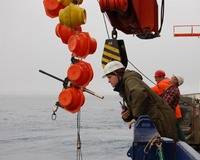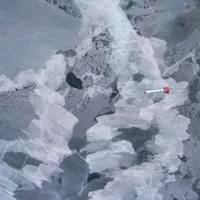Programmed Multikopter Flies Autonomously Through Arctic
How do you get an aircraft in the far reaches of the Arctic Ocean to the goal, if the compass does not provide reliable location data? Engineers aboard the research icebreaker Polarstern of the Alfred Wegener Institute programmed a Multikopter so that he can navigate near the North Pole, despite declination of the Earth's magnetic field. A first successful test flight together with autonomous landing celebrated scientists recently on an ice floe. "The autonomous navigation is in high latitudes is a major challenge," says Sascha Lehmenhecker, engineer at the Alfred Wegener Institute for Polar and Marine Research, the Helmholtz Centre for Polar and Marine Research (AWI). "Navigation is by means of magnetic sensors.
Research Icebreaker Sails for Arctic

The research vessel Polarstern has left Bremerhaven on course for the Arctic with 44 expedition participants from institutions from Germany, Belgium, USA and the United Kingdom who will spend around one month on board. Their main study area is the Fram Strait between Spitsbergen and Greenland where they will conduct long-term oceanographic measurements. The Fram Strait is the only deep sea water connection between the Arctic Ocean and the Atlantic. How much water is exchanged between these two seas and what heat and salt transport is associated with this?
Northern Sea Route Ice-free Soon?

The Northern Passage, the sea route along the North coast of Russia, is expected to be free of ice early again this summer. The forecast was made by sea ice physicists of the Alfred Wegener Institute for Polar and Marine Research in the Helmholtz Association based on a series of measurement flights over the Laptev Sea, a marginal sea of the Arctic Ocean. Amongs experts the shelf sea is known as an “ice factory” of Arctic sea ice. At the end of last winter the researchers discovered large areas of thin ice not being thick enough to withstand the summer melt.
Schiffko to Design Research Icebreaker
Wärtsilä's ship design and marine consultancy subsidiary, Schiffko, based in Hamburg, has been awarded a contract from the Alfred Wegener Institute for Polar and Marine Research of Bremerhaven, Germany, to design the revolutionary new European research icebreaker Aurora Borealis, which will have a deep-sea drilling capability. The contract, which was won in a public tender comprises the initial design concept, general arrangement planning, and full tender documentation. The ship shall facilitate research in ice and open water conditions in the fields of geology, geophysics, oceanography, biology, glaciology, bathymetry, meteorology, and atmosphere physics. The vessel will have the capability to navigate in up to 14.5 ft.





